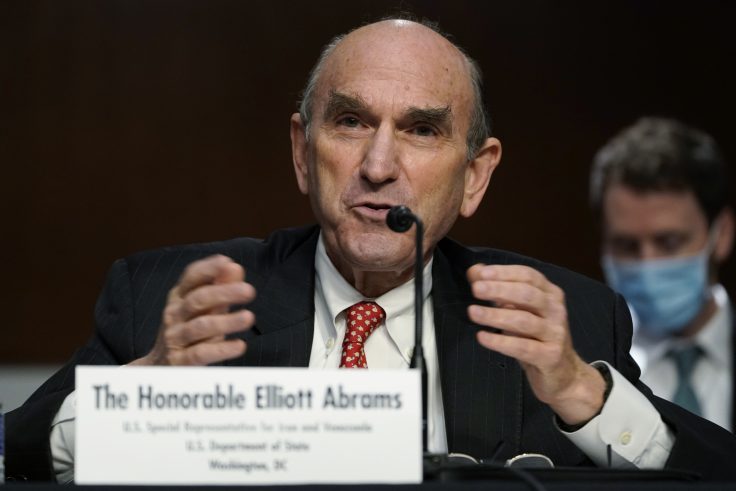Special envoy for Iran and Venezuela Elliott Abrams testified before the Senate Foreign Relations Committee Thursday, telling senators Iran’s economy lays in shambles due to American sanctions.
"Our efforts to disrupt the regime’s ability to carry out its malicious agenda have met with real success," Abrams said in his testimony. "By any measure, the Iranian regime is weaker today than when President Trump took office. The regime faces unprecedented and worsening economic and political crises that are exacerbated by the poor choices the regime makes in an effort to advance its radical ideology."
Abrams outlined statistics from the International Monetary Fund that reflect Iran's economic crisis. Iran has suffered consecutive years of GDP loss, with the economy shrinking by 5.5 percent in 2018 and 7.6 percent in 2019. Predictions for 2020 suggest that the trend will hold: Iran is likely to lose another 6 percent of its economy.
Other economic metrics signal Tehran’s dire straits. Iran’s budget deficit is a whopping 26 percent of its already shrinking GDP, with little prospect for recovery. As a result of robust oil export sanctions on Iran, the Islamic republic has lost 90 percent of its oil export revenue, totaling roughly $70 billion.
The economic recession has had impacts well beyond GDP and employment. Iran is the largest state sponsor of terror in the world, and the sanctions-induced downturn has forced major cutbacks to its ability to keep afloat terror groups that have long plagued regional stability.
Hezbollah and Hamas are now implementing austerity plans, Abrams said, which limit their capacity to commit violence and retain legitimacy with local governments that they have overtaken.
"We believe the lives of innumerable Iranians, Syrians, Iraqis, Yemenis, and other innocent civilians in the regime’s crosshairs have been saved," Abrams said of terrorist budget cuts. "This administration will never hesitate to protect our national security and prevent Iran from endangering the world."
Aside from economic sanctions, retaining aggressive military and diplomatic postures toward Iran has also brought dividends. At sea, Iran’s aggressive behavior has been reduced significantly since the Obama years, as Washington continues to apply pressure with carrier strike groups in the Strait of Hormuz.
Meanwhile, a combination of pursuing snapback sanctions and striking a series of peace deals between Israel and Gulf States has continuously weakened Iran’s position in the region.
These issues in total have led to a crisis of confidence in the Iranian government, Abrams told the committee. The 2020 elections in Iran signaled the lowest turnout in Iran’s history, an implicit rebuke to the state-sponsored candidates and closed elections.
"Every year, the regime loses the support of more and more Iranians," Abrams said. "The Iranian people are suffering under a corrupt and radical regime whose leaders care more about filling their own pockets and sending weapons and cash abroad than providing for their people."
